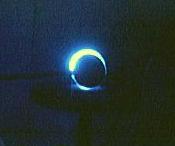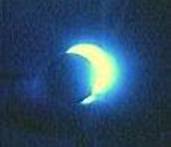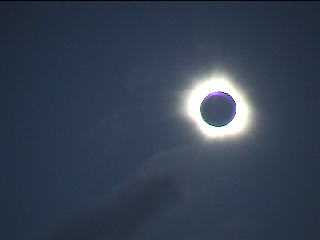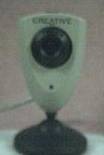HOME|Ideas and resoueces for planetary science experiments|How Solar Eclipses Occur
宇宙の実験教室
Ideas and resoueces for planetary science experiments
カテゴリ
Category
- 実験教室Idea and Resources for Space science experiments
- 対象項目別Category: Contents
- 学年単元別Category: Study Age
-
- 実践授業Activity Reports
タグ
Tag
 日食はどうしておきるの
日食はどうしておきるの
ねらい
日食のおきるしくみを理解しましょう。
日食とは一体どんな現象なのでしょうか?どんなしくみでおきるのでしょうか?
この教材では、日食という現象を地球からと宇宙からの2つの視点からとらえるために、地球儀の上にWebカメラを設置して地上の観測者の代表としました。
このカメラの観測した映像がパソコンの画面に表示され、それは液晶プロジェクターでスクリーンに投影され、みんなで見ることができます。
実験方法
実験結果
Webカメラが観測した模型の日食のようす
太陽(光源)はライトで、月は手前に見える黒い球です。
 皆既日食の模型
皆既日食の模型
地球儀上にできた月の影の中心から見ると、太陽は月にほとんどかくされてしまいました。
 部分日食の模型
部分日食の模型
地球儀上にできた月の影のふちの方から見ると、太陽が欠けて見えました。
考えよう
月、地球、太陽がどんな位置にあるときに、どこから見ると日食がおきるのか考えてみましょう。
日食のしくみ
 皆既日食 2004.12.4 オーストラリア セドゥナにて撮影
皆既日食 2004.12.4 オーストラリア セドゥナにて撮影
宇宙から見たときに、太陽・月・地球が一直線に並ぶと、地球に月の影が落ちます。

このとき、月の影ができてしまう地球上の地域から太陽を見ると、太陽が月に隠されて(食べられて)しまったように見えるのです。
 How Solar Eclipses Occur
How Solar Eclipses Occur
Introduction
Understanding the Mechanism of Solar Eclipses
What kind of phenomenon is a solar eclipse? How does it occur?
In this classroom exercise, the solar eclipse phenomenon is observed from two vantage points: the surface of the Earth and outer space. A web cam is set up on a globe to represent a ground-based observer.
The picture from the web cam appears on the screen of a computer, and this image is projected onto a large screen so it can be observed by the whole class.
Experimental Method
Things to Prepare
Globe; stick; Plasticine; Light source to represent Sun (e.g. flashlight); Web cam with filter; Computer; Projector
 |
Creative Inc. WEBCAM5 |  |
To add a sense of familiarity, the 'observer' was given a face. The light source representing the Sun was too bright for the web cam, so a 415nm band pass filter was attached as 'sunglasses' |
Preparation of the Earth, Moon & Sun Model
Roll the plasticine into a ball to use as the Moon
- Attach the plasticine Moon to the end of the stick can to allow it to be supported from a distance.
- Set up the light source representing the Sun at one end of the classroom and use it to illuminate the globe of the Earth.
- Using the stick, mount the Moon near the Earth.
- Depending on the position of the plasticine Moon, it sometimes casts a shadow on the globe, and sometimes not. In this way, the movement of the Moon's shadow on the Earth's surface can be simulated.
Observing with the Web cam
The web cam represents an observer.
Look at the image from the web cam when the 'observer' in the plasticine Moon's shadow and compare it with the image obtained when it is in full 'sunlight'.
The image from the web cam appears on the computer screen. Hooking the computer up to a projector, it will be possible for the whole class to observe the different web cam images.
Experimental Results
Model Solar Eclipse as Observed by the Web cam
The light source representing the Sun is visible as a bright disk, and the plasticine Moon is a dark disk in the foreground.
 Simulation of Total Solar Eclipse
Simulation of Total Solar Eclipse
As viewed from the centre of the 'Moon's' shadow on the globe, the 'Sun' is almost entirely hidden.
 Simulation of Partial Solar Eclipse
Simulation of Partial Solar Eclipse
As viewed from the edge of the 'Moon's' shadow on the globe, the 'Sun' is partially obscured, but still visible.
Discussion
Think about the relative positions of the Earth, Moon and Sun which are required for a solar eclipse to be visible on the the Earth's surface.
How Solar Eclipses Occur
 |
| Total Solar Eclipse 2002 Dec 4 Photographed from Ceduna, Australia As viewed from space, when the Sun, Moon and Earth form a straight line, the shadow of the Moon falls on the Earth |

At this time, an observer on the surface of the Earth in the region of the Moon's shadow will see the Sun being progressively covered by the Moon, as if being eaten up.











